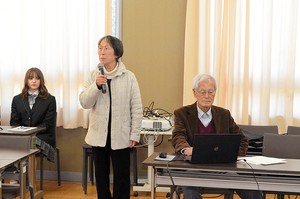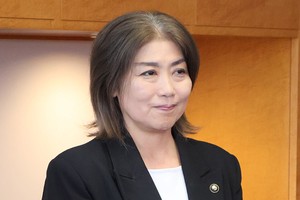By TAKASHI ENDO/ Staff Writer
April 20, 2022 at 17:17 JST
A large gap has emerged between employees and management at Japanese companies in their attitudes toward teleworking amid the pandemic, survey research shows.
The discrepancy comes despite the Japanese government’s continued promotion of teleworking as an important way to cut down on COVID-19 cases.
And researchers warn that companies may find themselves increasingly under pressure to address the strong desire among employees for the ability to work from home.
The polling shows that a large majority of those working from home want to continue doing so, but companies remain lukewarm about teleworking--particularly with no state of emergency in place over the novel coronavirus and pre-emergency measures lifted.
Company officials told opinion researchers that teleworking comes with several disadvantages. For example, it can hamper employee communication and make it difficult to assess how much work progress is being made from home.
Persol Research and Consulting Co. has been conducting periodic national surveys of about 20,000 employees on the shift to telework since March 2020.
It found that over the course of the pandemic, the number of workers surveyed who were teleworking increased as the COVID-19 situation worsened, but then stagnated once it hit about a third.
The firm’s first survey found that only 13.2 percent of respondents were working from home, but after the first state of emergency was declared in April 2020, that figure more than doubled to 27.9 percent.
Since then, the figure has floated around that point. In a study conducted in February, when there were more than 100,000 daily COVID-19 cases, the figure still stood at 28.5 percent.
Teikoku Databank Ltd. conducted its own study in February of about 1,800 companies and found 31.5 percent had implemented teleworking. But of that number, 52.1 percent of companies also said they had found many disadvantages with teleworking.
Yuji Kobayashi, a senior researcher at Persol, said that companies whose performance suffered due to the novel coronavirus pandemic may pin the blame for declines in productivity on teleworking.
The February survey found that about 80 percent of employees want to continue working from home.
“There is a high likelihood that those who have experienced teleworking will ask for an environment that allows them to work from home,” Kobayashi said. “The response made by companies will become even more important in the future.”
For some employees, the difference is big enough to convince them to start searching for work elsewhere.
One information technology engineer said she is contemplating finding a new job because her current employer asked workers to return to their assigned workplaces once pre-emergency measures were lifted.
“During the pandemic, I have come to feel more strongly that how I work is much more important than the money,” the 27-year-old said.
While she works for a company based in Tokyo, her work involves setting up computer systems mainly for financial institutions.
Whether she can telework or not depends on the needs of those financial companies.
In the spring of 2020, when the first wave of COVID-19 cases hit Japan, the company she happened to be assigned to said it had not established an environment that would allow her to work from home.
She finally started teleworking in December 2020. After becoming accustomed to working from her Chiba Prefecture home, the woman found the three-hour roundtrip commute to her assigned company to be unbearable.
She asked her superior in late March to assign her to a company that would allow her to work from home, but her request was essentially ignored. The woman is now searching job sites on the internet for openings that allow for full-time teleworking.
She said she intends to join another company next winter.




















A peek through the music industry’s curtain at the producers who harnessed social media to help their idols go global.
A series based on diplomatic documents declassified by Japan’s Foreign Ministry
Here is a collection of first-hand accounts by “hibakusha” atomic bomb survivors.
Cooking experts, chefs and others involved in the field of food introduce their special recipes intertwined with their paths in life.
A series about Japanese-Americans and their memories of World War II